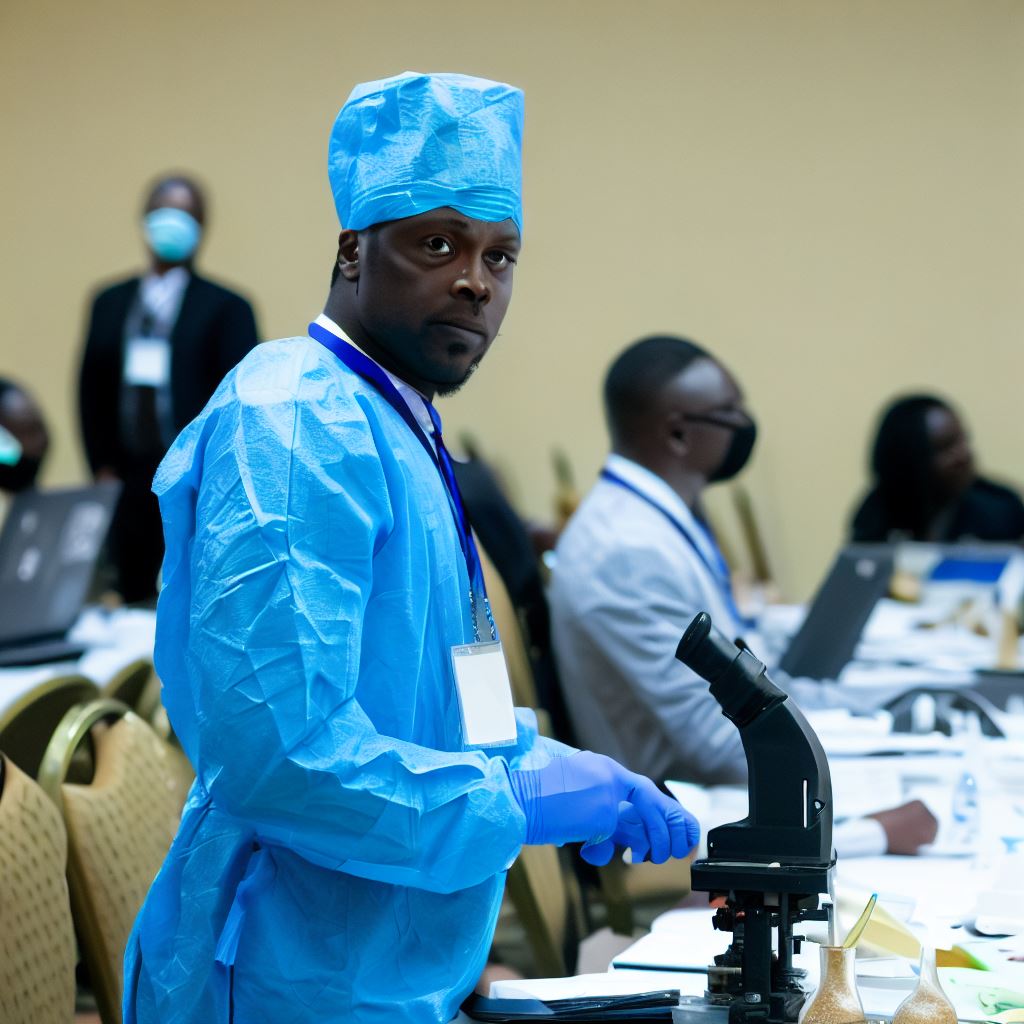Introduction
In the field of pathology, licensing and certification play crucial roles in ensuring competence and quality of practice.
The Licensing refers to the legal authorization granted by a governing body, while certification signifies meeting specific standards set by professional organizations.
Licensing and certification in the context of pathology
Licensing and certification in pathology involve meeting educational requirements, passing examinations, and undergoing supervised training.
These processes aim to establish a baseline of competence and ensure professional accountability.
Importance of licensing and certification for pathologists in Nigeria
Licensing and certification are vital for pathologists in Nigeria to safeguard public health and instill confidence in healthcare services.
They ensure that only qualified individuals practice pathology, minimizing the risk of misdiagnosis and improper treatment.
Certification also enhances professional development by encouraging pathologists to continually update their knowledge and skills.
It promotes a culture of continuous improvement and maintains high standards within the field.
Licensing and certification facilitate mobility and career advancement for pathologists.
With valid credentials, they can seek employment opportunities abroad and receive recognition for their expertise.
By establishing licensing and certification requirements, Nigeria can strengthen its healthcare system, improve patient safety, and create a framework for professional accountability.
It also allows for effective regulation and monitoring of the pathology profession, preventing the infiltration of unqualified practitioners.
Licensing and certification are integral components of the pathology profession in Nigeria.
They ensure competence, maintain quality standards, and foster professional growth.
Emphasizing their importance will contribute to the overall advancement and recognition of pathology as a vital healthcare specialization.
Overview of the Field of Pathology in Nigeria
Pathology is a crucial branch of medicine in Nigeria, primarily focused on diagnosing diseases.
In Nigeria, pathologists play a pivotal role in the healthcare system, providing valuable insights and analysis for proper treatment.
The field of pathology involves the examination of tissues, blood, and other bodily fluids to identify diseases accurately.
Pathologists are essential members of the healthcare team, collaborating with other specialists to ensure accurate diagnoses.
Their role extends beyond diagnosis, as they also contribute to patient management through treatment planning and monitoring.
Significance of Pathologists in the Healthcare System
Pathologists play an indispensable role in the healthcare system, forming the backbone of disease identification.
They provide essential information that helps medical practitioners in determining the appropriate course of treatment for patients.
By examining tissues and fluids, pathologists can identify cancer, infections, and various chronic or genetic conditions.
The accurate diagnosis provided by pathologists enables early intervention and appropriate therapeutic strategies.
Without the expertise of pathologists, the healthcare system would face significant challenges in managing diseases effectively.
Statistics on the Number of Pathologists in Nigeria
According to recent statistics, the number of pathologists in Nigeria is limited.
As of 2021, the country reportedly had only 200 pathologists, indicating a severe shortage in this critical specialty.
The low number of pathologists in Nigeria poses a significant challenge in providing timely and accurate diagnoses.
The shortage creates a bottleneck in the healthcare system, affecting the overall quality of patient care.
To mitigate this issue, efforts are underway to train more pathologists and increase their numbers nationwide.
Various institutions and organizations are working to provide educational opportunities and scholarships for aspiring pathologists.
Pathology holds immense importance in Nigeria’s healthcare system, ensuring accurate disease diagnosis and appropriate treatment.
However, the limited number of pathologists poses a significant challenge that needs urgent attention and investment from all stakeholders.
By addressing this shortage, Nigeria can enhance its healthcare infrastructure and improve patient outcomes.
Read: Success Stories: Leading Forensic Pathologists in Nigeria
Licensing requirements for pathologists in Nigeria
Obtaining a license to practice pathology in Nigeria requires certain prerequisites, educational qualifications, training programs, and examinations.
Prerequisites for obtaining a license to practice pathology
- Must be a Nigerian citizen or have legal residency status in Nigeria.
- Must have completed a medical degree from a recognized university.
- Must have completed a mandatory one-year internship in a medical institution.
- Must possess a valid practicing license from the Medical and Dental Council of Nigeria (MDCN).
Educational qualifications and training programs necessary
- Pathologists must have completed a minimum of six years of medical school and postgraduate training.
- They must have obtained a Bachelor of Medicine, Bachelor of Surgery (MBBS) degree.
- After obtaining the MBBS degree, pathologists must pursue specialization in pathology.
- Specialization is usually done through a residency program in an accredited teaching hospital.
Examinations or assessments required for licensing
- Pathologists in Nigeria must pass the Part I and Part II examinations conducted by the National Postgraduate Medical College of Nigeria (NPMCN).
- Part I exam consists of written and multiple-choice questions evaluating basic knowledge in pathology.
- Part II exam involves practical and oral assessments to test clinical skills and decision-making abilities in pathology.
- Successful completion of these examinations leads to the award of a fellowship in Pathology by the NPMCN.
Once all the prerequisites, educational qualifications, and examinations are successfully completed, pathologists can apply for a license to practice pathology in Nigeria.
The license allows them to provide diagnostic, consultative, and supervisory services in pathology.
It is important for pathologists to continuously update their knowledge and skills by participating in continuing professional development programs and attending relevant conferences and workshops.
This ensures they stay abreast of the latest advancements and techniques in the field.
Pathologists are also required to adhere to ethical standards and guidelines set by professional bodies such as the Nigerian Medical Association (NMA) and the Nigerian Society of Pathologists (NSP).
These guidelines promote professional conduct, patient confidentiality, and quality assurance in pathology practice.
The licensing requirements for pathologists in Nigeria involve completing medical education, obtaining relevant qualifications, undergoing specialized training, and passing examinations.
By fulfilling these requirements, pathologists can contribute to the healthcare system in Nigeria and provide accurate diagnostic services to patients.
Read: Geology Careers in Nigeria: An In-Depth Job Overview
Certification options for pathologists in Nigeria
Pathologists in Nigeria have several certification options available to them.
These certifications are granted by different bodies or organizations within the country.
1. Medical and Dental Council of Nigeria (MDCN)
- The MDCN is the primary certification body for medical professionals in Nigeria, including pathologists.
- Pathologists seeking certification must have completed their medical degree and a postgraduate residency program in Pathology.
- They need to pass the Part I and Part II examinations conducted by the West African College of Physicians (WACP) in the discipline of Pathology.
- After passing the examinations, the candidates can apply to the MDCN for certification as a Pathologist.
2. West African College of Physicians (WACP)
- The WACP is an organization that provides certification and training in various medical specialties, including Pathology.
- Pathologists can become certified by the WACP after completing a minimum of five years of postgraduate training in pathology.
- They need to pass the Part I and Part II examinations in Pathology to obtain certification.
3. Nigerian Medical Association (NMA)
- The NMA is a professional association for medical doctors in Nigeria, and it offers specialization options for certified pathologists.
- Pathologists who are already certified can choose to specialize in areas such as forensic pathology, pediatric pathology, or molecular pathology.
- Specialization requires additional training and certification beyond the basic certification in Pathology.
- Pathologists can enhance their skills and knowledge in a specific area of pathology through specialization.
4. National Postgraduate Medical College of Nigeria (NPMCN)
- The NPMCN is a postgraduate medical college that offers certification programs in various medical specialties, including Pathology.
- Pathologists can obtain certification from the NPMCN by completing a postgraduate training program in pathology and passing the college’s examinations.
- The NPMCN offers different levels of certification, including the Fellowship of the National Postgraduate Medical College (FMCPath) in Pathology.
Pathologists in Nigeria have multiple options for certification.
These options include the Medical and Dental Council of Nigeria, the West African College of Physicians, the Nigerian Medical Association, and the National Postgraduate Medical College of Nigeria.
Each certification body has specific requirements and processes that pathologists must fulfill to obtain certification.
Certified pathologists can choose to specialize in specific areas of pathology to further enhance their skills and knowledge.
Read: Top Universities in Nigeria for Aspiring Geologists

Benefits of Licensing and Certification for Pathologists
Pathologists play a crucial role in diagnosing and treating various medical conditions.
In Nigeria, licensing and certification for pathologists offer numerous benefits for both professionals and the healthcare industry as a whole.
Advantages of being licensed and certified in terms of career advancement
- Greater job opportunities and increased employability for licensed and certified pathologists.
- Improved chances of securing higher positions and promotions within healthcare organizations.
- Enhanced professional reputation and recognition in the field.
- Access to specialized training programs and advanced career development opportunities.
- Having a license and certification demonstrates commitment and dedication to the profession.
Licensing and certification contribute to maintaining high standards in the field
- Regulatory bodies set stringent requirements for licensing and certification, ensuring only qualified professionals practice as pathologists.
- Continuing education and re-certification programs help pathologists stay updated with the latest advancements in their field.
- Regular assessments and evaluations ensure pathologists meet and maintain the required competency standards.
- Strict adherence to ethical guidelines and professional conduct is expected from licensed and certified pathologists.
- Licensing and certification ensure proper oversight and accountability in the practice of pathology.
Trust and credibility associated with being licensed and certified
- Patient trust is significantly increased when they receive care from licensed and certified pathologists.
- Licensing and certification act as proof of qualifications and expertise, instilling confidence in patients.
- Healthcare organizations prioritize hiring licensed and certified pathologists to maintain their reputation and credibility.
- Pathologists who are licensed and certified are more likely to be included in professional networks and collaborations.
- Being part of a regulated profession enhances public trust and confidence in the entire healthcare system.
Licensing and certification offer numerous benefits for pathologists in Nigeria.
These credentials not only contribute to career advancement but also play a vital role in maintaining high standards, trust, and credibility in the field.
Pathologists who obtain licenses and certifications are better positioned for success and have a positive impact on the healthcare industry as a whole.
Read: How to Become a Geologist in Nigeria: A Step-by-Step Guide
Challenges and Limitations in the Licensing and Certification Process for Pathologists in Nigeria
List of Challenges and Limitations
- Lack of standardized and transparent licensing and certification procedures.
- Inconsistent interpretation and implementation of licensing requirements across different states.
- Inadequate training and educational opportunities for aspiring pathologists.
- Limited availability of accredited training programs and institutions in the country.
- Difficulties in obtaining necessary documentation and meeting documentation requirements.
- Poor infrastructure and limited resources in some healthcare facilities, hindering the evaluation and certification process.
- High costs associated with licensing and certification applications, exams, and processing fees.
Issues or Hurdles Faced by Pathologists during the Licensing Process
- Lack of clear guidelines and requirements from regulatory bodies causing confusion and delays.
- Lengthy and bureaucratic application process, including excessive paperwork and unnecessary administrative hurdles.
- Limited access to mentorship and supervised training opportunities.
- Inconsistency in the assessment of competency and skills during licensing examinations.
- Language barriers, especially for non-English speaking pathologists, leading to miscommunication and difficulties in meeting requirements.
Potential Delays or Difficulties in Obtaining Certification
- Backlogs and long waiting periods for certification exams due to limited capacity and resources.
- Challenges in obtaining required recommendations and references from qualified professionals.
- Difficulties in acquiring and maintaining the necessary continuing education credits for certification renewal.
- Insufficient number of examiners and evaluators, causing delays in assessment and certification decisions.
- Inadequate funding and support for regulatory bodies, resulting in slower processing times.
Improvements and Reforms Needed in the Current System
- Introduction of standardized and transparent licensing and certification procedures across all states.
- Development of a centralized database to streamline application and documentation processes.
- Expansion of training programs and institutions to increase capacity and improve accessibility.
- Enhanced collaboration between regulatory bodies and healthcare institutions to provide mentorship and training opportunities.
- Regular review and update of licensing requirements to align with international standards and advancements in the field.
- Reduced costs associated with licensing and certification applications, exams, and processing fees.
- Improved infrastructure in healthcare facilities to facilitate effective evaluation and certification processes.
The licensing and certification process for pathologists in Nigeria is plagued by challenges and limitations.
These include a lack of standardized procedures, inadequate training opportunities, and administrative burdens.
Pathologists also face issues in meeting requirements and obtaining the necessary certification.
However, with the implementation of increased training opportunities, the current system can be enhanced to meet international standards and ensure a competent pathologist workforce in Nigeria.
Conclusion
Licensing and certification play a crucial role in the field of pathology in Nigeria.
It ensures that pathologists have met the necessary educational requirements and professional standards.
Obtaining proper licensure and certification should be a priority for aspiring pathologists in Nigeria to practice legally and provide quality patient care.
Continuous professional development and lifelong learning are essential in the field of pathology.
Pathologists should stay updated with the latest advancements and research to improve their skills and knowledge.
This ongoing learning process enables pathologists to provide accurate diagnoses and contribute to the advancement of the field in Nigeria.
Overall, licensing and certification are vital for pathologists in Nigeria.
It not only ensures the credibility of the profession but also promotes patient safety and quality of healthcare services.
Aspiring pathologists should recognize the importance of obtaining proper licensure and certification, as well as dedicating themselves to continuous professional development throughout their careers.




